Team Members (A-L)
E. Dale Abel, MD, PhD - Endocrinology, Metabolism & Cardiovascular Disease
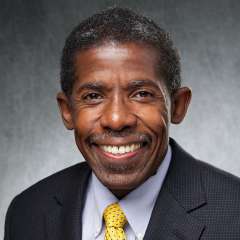
William S. Adams Distinguished Professor of Medicine
Chair and Executive Medical Director
Department of Medicine
David Geffen School of Medicine and UCLA Health
Dr. Abel graduated with Distinction from the University of the West Indies School of Medicine, obtained a DPhil from Oxford University as a Rhodes Scholar, trained in Internal Medicine at Northwestern University, where he was chief resident and in endocrinology at the Beth Israel Deaconess Medical Center, Harvard Medical school. Dr. Abel has had a distinguished career in endocrine, metabolism and cardiovascular research. His pioneering work on glucose transport and mitochondrial metabolism launched his current research interests: molecular mechanisms responsible for cardiovascular complications of diabetes. Dr. Abel has published more than 250 peer reviewed publications in competitive journals, his work has been highly cited and has shaped much of current understanding of the metabolic mechanisms underlying heart failure, particularly in obesity and diabetes. Dr. Abel is the recipient of numerous awards for scholarship and mentorship, including awards and endowed lectureships such as the Fred Conrad Koch Lifetime Achievement Award of the Endocrine Society, the the 2018 African American Museum of Iowa History Makers Award. He is an elected member of the American Association of Physicians (AAP), the American Society for Clinical Investigation (ASCI), the American Clinical and Climatological Association (ACCA), the National Academy of Medicine (NAM) and the National Academy of Sciences (NAS). He is past president of the Endocrine Society and the Association of Professors of Medicine. Dr. Abel Profile
Vatche G. Agopian, MD - Liver Transplantation, Hepatobiliary Surgery & Pharmacology
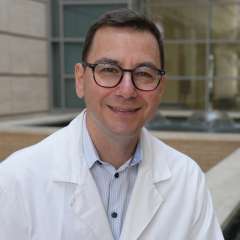
Professor of Surgery and Pharmacology
Co-Director, Comprehensive Liver Research Center
Director, Dumont-UCLA Liver Cancer Center
Liver Transplantation and Hepatobiliary Surgery
Department of Surgery
David Geffen School of Medicine at UCLA
Dr. Agopian is professor of surgery and pharmacology at the David Geffen School of Medicine at UCLA, and serves as the director of the Dumont-UCLA Liver Cancer Center, which includes a multidisciplinary team of hepatologists, medical oncologists, interventional radiologists, radiation oncologists, and interventional gastroenterologists in delivering evidence-based, state-of-the-art care to patients with primary and secondary liver malignancies. His clinical expertise is focused on liver transplantation and the surgical management of both benign and malignant conditions of the liver and bile ducts. Dr. Agopian is the principal investigator of a National Institutes of Health funded translational laboratory focused on the development of blood-based biomarkers (“liquid biopsy”) for the early detection and prognostication of hepatocellular carcinoma- the most common primary liver malignancy. In this capacity, he has developed an extensive biorepository of blood and tissue samples from patients with liver cancer, cirrhosis, and healthy controls. He also serves as the deputy editor of Liver Transplantation, a leading journal in the field. Dr. Agopian Profile
Lauren V. Albrecht, PhD - Pharmaceutical Sciences; Developmental & Cell Biology

Assistant Professor
Department of Pharmaceutical Sciences
Department of Developmental and Cell Biology
University of California Irvine
Dr. Albrecht is an assistant professor at the University of California Irvine in the Department of Pharmaceutical Sciences and the Department of Developmental and Cell Biology. Dr. Albrecht’s research laboratory applies chemical and cell biological approaches to understand organellar signaling and metabolism in live cells and remodeling tissues. Additionally, her group develops novel proximity-based methods to rapidly control protein levels in fundamental research and clinical settings. She received her bachelor of chemistry from the University of California San Diego and performed structural biology research in the laboratory of Stanley Opella using Nuclear Magnetic Resonance to elucidate GPCR proteins. Dr. Albrecht earned her PhD at Northwestern University in the laboratory of Kathleen Green. Her PhD work led to new molecular insights into cytoskeletal remodeling and cell-cell contacts in genetic skin and heart disease. Subsequently, Dr. Albrecht was an AP Giannini fellow in the Department of Biological Chemistry at the University of California Los Angeles and the Howard Hughes Medical Institute. During her time in the lab of Edward De Robertis, Dr. Albrecht’s postdoctoral studies applied microscopy and biochemistry to understand the role of autophagy in cellular metabolism and tissue development. Dr. Albrecht started her independent research laboratory in the Fall of 2021 at the University of California Irvine. Dr. Albrecht’s group has published new research in the fields of Wnt signaling, lysosomes, and cancer metabolism using disease models and organoid systems. Dr. Albrecht’s group has also uncovered new molecular insight into bone and kidney disease in her collaboration with Dr. Isidro Salusky, chief of Pediatric Nephrology and director of the Pediatric Dialysis Program in the David Geffen School of Medicine at UCLA. Dr. Albrecht’s work has been featured in Science Advances, Kidney International, PNAS, Cell Reports, the Journal of Cell Biology, Nutrients, and Metabolites. Further, Dr. Albrecht’s work has been continually supported by the Howard Hughes Medical Institute, NIGMS, the American Heart Association, the A.P. Gianni Foundation, and the Cystinosis Research Foundation. Dr. Albrecht also serves as the Departmental DECADE representative that focuses on improving inclusive excellence across the University of California communities. The Albrecht Laboratory
Roshan Bastani, PhD - Health Policy & Management
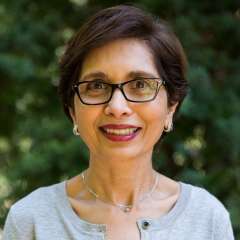
Professor, Health Policy and Management
Director, UCLA Kaiser Permanente Center for Health Equity
Director, UCLA Center for Prevention Research
Co-Director, Cancer Prevention and Control Research
UCLA Fielding School of Public Health
Director, Community Engagement
Co-Director, Cancer Control and Survivorship
Jonsson Comprehensive Cancer Center, UCLA
Dr. Bastani is a social and health psychologist who has been conducting health disparities intervention research for over 35 years, with a focus on implementing rigorous yet pragmatic individual, community, and system-directed intervention trials to improve quality of care and health outcomes and reduce disparities. She has led a large number of studies among low income, ethnic minority and immigrant populations in both clinical and community settings and has had continuous research funding from the National Institutes of Health since 1988. Her research is conceptually grounded and includes strong and equitable community partnerships. Her methodological expertise includes survey research; qualitative and quantitative methods; research design; comparative effectiveness trials; program evaluation; implementation science; and utilization of electronic health records and other administrative databases for research. She also served an 11-year term as associate dean for Research in the School of Public Health.
Dr. Bastani’s research includes studies on breast, colorectal, lung, cervix, and prostate cancer screening and diagnostic follow-up; hepatitis B screening; tobacco control; melanoma prevention; obesity control; liver disease; and HPV vaccine uptake. This work includes examination of the drivers of disparities among underserved groups, implementation of pragmatic intervention trials to mitigate observed disparities, methodological studies, as well as studies to advance theory in the field. Examples of current/recent research include system-focused pragmatic implementation trials to increase HPV vaccine uptake among low income, ethnic minority adolescents in the county health department and two large multi-site Federally Qualified Health Centers (FQHCs) (NCI R01; PCORI); a system-level cluster-randomized obesity prevention trial set in preschools located in underserved neighborhoods (NICHD R01); a trial of a multilevel, system intervention to improve CRC screening in a large FQHC serving an ethnic minority population (CA-TRDRP); a study to identify gaps in clinical care processes contributing to low rates of diagnostic follow-up of abnormal findings on Fecal Immunochemical Testing (NCI R03); an evaluation of effective approaches for reducing the excess cervical cancer burden in Malawi and Kenya (NCI R56); a trial of a multilevel health system intervention to increase surveillance colonoscopy for high risk polyps (NCI R01); and studies to increase uptake of lung cancer screening (TRDRP) among high-risk groups. In addition to conducting her own research, Dr. Bastani devotes considerable effort to mentoring junior investigators, particularly individuals traditionally underrepresented in science and those interested in research among underserved populations. For over 15 years, she led a National Cancer Institute post-doctoral career development program with a heavy focus on transdisciplinary cancer control training and disparities research. Dr. Bastani Profile
Jihane N. Benhammou, MD, PhD - Transplant Hepatology
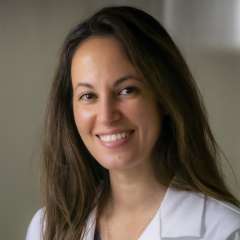
Assistant Clinical Professor of Medicine
Vatche and Tamar Manoukian Division of Digestive Diseases
David Geffen School of Medicine at UCLA
Dr. Benhammou completed her undergraduate studies at the University of Texas at Austin, with a major in human biology. She then completed medical school at University of California, San Francisco with a thesis in molecular medicine. Before starting her internship at the University of California, Los Angeles in internal medicine, Dr. Benhammou participated in a two-year intramural program at the National Cancer Institutes studying functional genomics and hereditary forms of kidney cancer.
Dr. Benhammou went on to complete her internal medicine and gastroenterology training at UCLA. There, she received advanced research training in the UCLA Specialty Training and Advanced Research (STAR) program and NIH T32, which supported her graduate studies in the Department of Molecular, Cellular, and Integrative Physiology. Her doctoral dissertation addressed the clinical risk factors of MASLD hepatocellular carcinoma and the molecular mechanisms at play in MASLD pathogenesis. Following her PhD, Dr. Benhammou completed additional clinical training in transplant hepatology at UCLA.
Dr. Benhammou joined the digestive diseases and hepatology faculty at UCLA and Greater Los Angeles VA where she will care for patients with chronic liver disease before and after liver transplantation. She continues to pursue her research on MASLD-associated hepatocellular carcinoma using multi-pronged novel research tools. Her laboratory is within the Comprehensive Liver Research Center at UCLA where she collaborates with clinical, translational and basic scientists. She is board certified in internal medicine, gastroenterology and transplant hepatology. Benhammou Lab
Ambre M. Bertholet, PhD - Physiology

Assistant Professor
Department of Physiology
David Geffen School of Medicine at UCLA
Dr. Bertholet was trained in Toulouse, France at the Université Paul Sabatier. She earned her BS in cell biology and physiology, MS in gene cells and development, and her PhD in biology, health and biotechnologies. Subsequently, she did her postdoctoral training with Dr. Yuiry Kirichok at UC San Francisco and is currently an assistant research physiologist. Her interest in mitochondria was sparked as a graduate student in the laboratory of Pr. Pascale Belenguer. During her PhD research, she analyzed the influence of mitochondrial dynamics on neuronal maturation and functioning. As a postdoctoral trainee, she focused on another important aspect of mitochondrial physiology – the transport of ions and metabolites across the mitochondrial membranes. In the Kirichok lab, she developed a patch-clamp method for directly measuring proton movement across the inner mitochondrial membrane. This innovation enabled Dr. Bertholet to identify novel transport mechanisms for the mitochondrial H+ leak responsible for mitochondrial heat production and metabolic regulation of energy expenditure. Bertholet Lab
Debika Bhattacharya, MD, MSc - Infectious Diseases
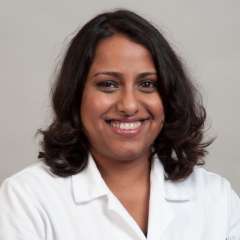
Clinical Professor of Medicine
Division of Infectious Diseases
Associate Program Director, Infectious Diseases Fellowship-UCLA
David Geffen School of Medicine at UCLA
Co-Director Viral Hepatitis Program, Greater Los Angeles VA Healthcare System
Co-Director NODES Program, Greater Los Angeles VA Healthcare System
Dr. Bhattacharya’s research has focused on clinical outcomes in persons living with HIV and viral hepatitis, and, more recently, novel clinical therapeutics for HBV. She has been independently funded by the NIH (K23, R01s) and VA ORD since her time as an assistant professor. She is the chair of the Hepatitis Transformative Science Group (TSG) within the AIDS Clinical Trials Group (ACTG), where she leads the scientific agenda for novel HBV therapeutics for the world’s largest HIV clinical trials organization. She is the IDSA co-chair of the AASLD/IDSA Hepatitis C Treatment Guidance Panel. Her roles at the GLAVAHCS include being co-director of the Viral Hepatitis Program of the Greater Los Angeles Veterans Affairs Healthcare System (GLAVAHS) and co-Director of the NODES program which provides oversight and clinical trial infrastructure support for clinical trials. She is also a member of the Writing Panel for the NIH-CDC-HIVMA/IDSA Guidelines for the Prevention and Treatment of Opportunistic Infections in HIV-Infected Adults and Adolescents. Dr. Bhattacharya Profile
Charles Brenner, PhD - Diabetes & Cancer Metabolism
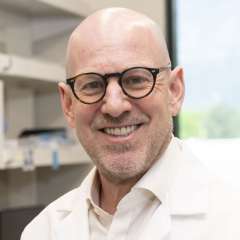
Professor and Alfred E. Mann Family Foundation Chair
Department of Diabetes and Cancer Metabolism
Beckman Research Institute
City of Hope
Dr. Brenner is considered one of the leading global authorities in the biology and regulation of nicotinamide adenine dinucleotide (NAD) coenzymes in health and disease. Since 2020, he has served as the inaugural chair of the Department of Diabetes and Cancer Metabolism at City of Hope, a unit that links their comprehensive cancer center and the Arthur Riggs Diabetes and Metabolism Research Institute. Brenner earned his PhD at Stanford and then conducted a Leukemia Society of America postdoctoral fellowship at Brandeis prior to establishing the Brenner laboratory at Thomas Jefferson University in 1996. He rose through the faculty ranks at Jefferson and at Dartmouth Medical School prior to being recruited to serve as the Roy J. Carver Chair and Head of Biochemistry at University of Iowa from 2009 to 2020. He is well known for purification and characterization of Kex2 protease—the prototypical PCSK processing enzyme, for enzymology and gene discovery with respect to nucleotide-binding and synthesizing enzymes, and especially for discoveries in NAD metabolism. Brenner is credited with discovery of the vitamin activity of nicotinamide riboside (NR), characterization of the NR kinase pathway and the signal-dependent biosynthesis of NAADP, development of quantitative targeted NAD metabolomics, extensive animal modeling of the NAD system in disease, and early phase translation of NAD technologies. Brenner Lab
Bishuang Cai, PhD - Digestive Diseases

Associate Professor in Residence
Vatche and Tamar Manoukian Division of Digestive Diseases
David Geffen School of Medicine at UCLA
Dr. Cai received her PhD from the University of Nebraska Medical Center, where she studied endocytic membrane trafficking. She then joined Dr. Ira Tabas’s lab at Columbia University Irving Medical Center as a postdoctoral research scientist, focusing on translational research with an emphasis on macrophage biology in cardiometabolic diseases. In 2020, Dr. Cai joined the Liver Division in the Department of Medicine at the Icahn School of Medicine at Mount Sinai as an assistant professor to begin her independent research career. She has now joined the Vatche & Tamar Manoukian Division of Digestive Diseases in the Department of Medicine at UCLA as an associate professor to continue pursuing her research and academic goals. Dr. Cai’s current research centers on endocytic membrane trafficking in metabolic-dysfunction-associated steatohepatitis (MASH) and MASH-related cardiometabolic diseases. Her work has been supported by multiple NIH and foundation grants. Cai Lab
Jason Chiang, MD, PhD - Interventional Radiology

Assistant Professor, Radiological Sciences
Interventional Radiology Section
David Geffen School of Medicine at UCLA
Jonsson Comprehensive Cancer Center
Dr. Chiang received his bachelor's degree in biomedical engineering with a minor in mathematics from Johns Hopkins University. After college, he was awarded a Fulbright Grant to conduct research in Hannover, Germany. He then entered the Medical Scientist Training Program at the University of Wisconsin - Madison where he obtained his MD and PhD (in biomedical engineering) degree, with a certificate in Clinical Investigations. He did his internship at Gundersen Hospital Systems in Lacrosse, WI, and returned to Los Angeles to complete his diagnostic and interventional radiology residency training. After residency, he accepted an interventional radiology faculty position at UCLA.
His clinical focus is on the diagnostic imaging and treatment of solid tumors with minimally-invasive techniques. He divides his time between vascular/interventional procedures and cross-sectional interventional procedures, with a focus on interventional oncology, vascular disease and liver interventions. He also runs an active NIH-funded translational research laboratory focused on bringing the latest cutting edge technology to his clinical patient population. Chiang Lab
Gina Choi, MD - Transplant Hepatology

Associate Director, Transplant Hepatology Fellowship Program
Health Sciences Associate Professor of Medicine and Surgery
Vatche and Tamar Manoukian Division of Digestive Diseases
Pfleger Liver Institute
Dumont-UCLA Liver Transplant Center
David Geffen School of Medicine at UCLA
Dr. Choi specializes in general and transplant hepatology. She focuses on treating patients with the complications of cirrhosis and manages their evaluation and care before and after liver transplant. She is well versed in the newest approaches to treat viral hepatitis and fatty liver. She is part of a multi-disciplinary team employing the latest treatments for liver cancer. She is particularly interested in autoimmune liver disease, including autoimmune hepatitis and primary biliary cholangitis, and in caring for women with liver disease, including in pregnancy.
Dr. Choi graduated from Stanford University and subsequently spent one year in Korea as a Fulbright Scholar. She speaks both English and Korean. She earned her medical degree at the University of California, San Francisco (UCSF) and completed her internal medicine residency at New York University (NYU). This was followed by a gastroenterology fellowship at UCLA. Dr. Choi then pursued an additional year of advanced training in transplant hepatology at the University of Pennsylvania. She has received numerous teaching awards and is recognized as a Southern California Rising Star since 2016. Dr. Choi is board certified in gastroenterology and transplant hepatology. Dr. Choi Profile
Arpana Church, PhD - Digestive Diseases
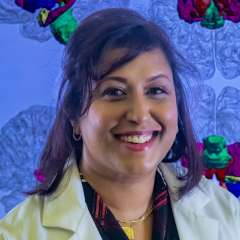
Co-Director, Goodman-Luskin Microbiome Center
Director, Neuroimaging Core, G. Oppenheimer Center for Neurobiology of Stress and Resilience
Ingestive Behavior and Obesity Program
Associate Professor
Vatche and Tamar Manoukian Division of Digestive Diseases
David Geffen School of Medicine at UCLA
Dr. Church completed a PhD degree in psychology, followed by an APA accredited clinical internship at Massachusetts General Hospital/Harvard Medical Center. Her programmatic line of research focuses on the interactions between environmental and biological factors in shaping neurobiological phenotypes associated with stress-based diseases such as obesity. Broadly defined, her research aims to integrate two systems (the brain and the gut) in order to better understand the underlying mechanisms associated with obesity and altered ingestive behaviors. The application of a “systems biology” approach to her research allows her to test the interactions between multiple factors, both inside and outside the body (e.g., sex, race, brain, microbiome, inflammation, environment), in order to better understand the complex pathophysiology of obesity. This is relevant to obesity, as it is a risk factor for many chronic diseases, and disproportionately affects ethnic minorities and women. These alarming projections have led to NIH and Healthy People 2020 priority initiatives directed at reducing ethnic and sex disparities. Her goal is to develop a comprehensive model that provides a powerful and sensitive biomarker that will increase biological readouts of obesity and altered ingestive behaviors, thus bringing to the forefront those individuals who are at increased risk as a result of disadvantaged backgrounds. She recently received a R01 grant from NIMHD (NIH) on the “Social Isolation and Discrimination as Stressors Influencing Brain-Gut Microbiome Alterations among Filipino and Mexican American.” She has also received several industry funded grants as PI and till date she has published over 70 peer-reviewed articles. Church Lab
Stephanie M. Correa, PhD - Integrative Biology & Physiology
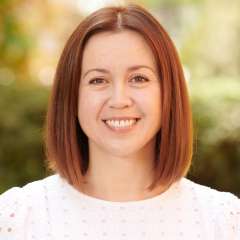
Associate Professor, Department of Integrative Biology and Physiology
UCLA College of Life Sciences
Dr. Correa is a neuroendocrinologist studying the effects of reproductive hormones on temperature, energy balance, and metabolic health, with the goal of understanding weight gain and hot flashes that often occur in menopause. To understand the mechanisms by which estrogens alter homeostasis, the Correa group focuses on the following broad questions: How does the brain regulate temperature and energy balance? How do homeostatic neural circuits differ between males and females? How are homeostatic circuits modulated by estrogens? The Correa lab combines genetically engineered mice and new viral tools to define the neurons that drive estrogen-responsive and sex-specific changes in energy balance. This approach allows us to dissect the effects of estrogen on distinct neuronal populations with spatial, molecular, and temporal specificity. Dr. Correa earned a BA in biology from Pomona College and a PhD in neurobiology and behavior from Cornell University. Since starting her lab UCLA in 2016, Dr. Correa has been named a Kavli Fellow by the National Academy of Sciences in 2020, one of 100 Inspiring Hispanic/Latinx Scientists in America by Cell Press & Science Signaling Technology in 2020, and an Allen Distinguished Investigator by the Paul G. Allen Frontiers Group in 2023. She received the UCLA Life Science Excellence Award for Outstanding Research Publication in 2020, the UCLA Life Science Excellence Award for Outstanding Contributions to Diversity in 2022, and the Frank A. Beach New Investigator Award from Society for Behavioral Neuroendocrinology in 2020. Beyond UCLA, Dr. Correa has served in several leadership positions, including as secretary of the Society for Behavioral Neuroendocrinology, on the DEI committees for the Society for Behavioral Neuroendocrinology and the Organization for the Study of Sex Differences, and as co-director of Summer Program in Neuroscience, Excellence and Success (SPINES) at the Marine Biological Laboratory in Woods Hole. Correa Lab
Anthony J. Covarrubias, PhD - Microbiology, Immunology & Molecular Genetics
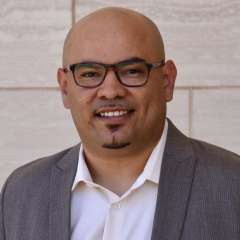
Assistant Professor
Department of Microbiology, Immunology, and Molecular Genetics
UCLA College of Life Sciences
Dr. Covarrubias is a macrophage biologist with expertise in immuno-metabolism, and how inflammation and metabolism are integrated to regulate metabolic health and disease states including aging, NAFLD, cancer, and cardiovascular disease. Dr. Covarrubias is a first-generation college graduate from Los Angeles, CA. He received his BS in biochemistry from UCLA, a PhD from Harvard University, and trained during his post-doc at UCSF/Gladstone Institute/ and the Buck Institute of Aging. Dr. Covarrubias identified the nutrient-sensing Akt-mTORC1 pathway as a critical regulator of macrophage polarization. He also showed that activation of the Akt target ACLY catalyzes the increase in macrophage cytosolic/nuclear pools of acetyl-CoA. These findings suggest how nutrient and metabolic status can fine-tune macrophage function via nutrient sensing pathways. Dr. Covarrubias’ recent work is focused on how diet and aging-related inflammation impacts the aging process. In a recent manuscript he showed that the decline of NAD+ during aging is driven by the activation of tissue resident macrophages via senescent cells. As senescent cells progressively accumulate in aging tissues, these results highlight a new causal link between visceral tissue senescence, NAD+, and immuno-metabolic dysregulation during aging, an active area of investigation in the Covarrubias Lab at UCLA.
Richard S. Finn, MD - Hematology Oncology; Surgery
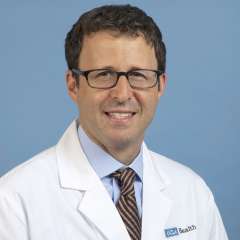
Dr. Finn currently splits his time between patient care and directing the Translational Research Laboratory in the Division of Hematology Oncology. His research interests are focused in the development of targeted therapeutics for solid tumors across histologies to support the larger efforts of the department. His personal interests lie in the development of these targeted agents in hepato-biliary and breast cancers. He has two-half days dedicated to patient care, one of which is as a leader in the multi-disciplinary hepato-biliary cancer program at UCLA where he is involved with clinical studies aimed at bringing novel therapeutics into the treatment of patients with these malignancies. Provider profile
Yvonne N. Flores, PhD, MPH - Health Policy & Management; Epidemiology

Associate Professor, Department of Health Policy and Management
UCLA Fielding School of Public Health
Research Scientist, UCLA Center for Cancer Prevention and Control Research Member, UCLA-Kaiser Permanente Center for Health Equity and UCLA Health Jonsson Comprehensive Cancer Center
Dr. Flores obtained a master’s in public health degree from the UCLA Department of Health Policy and Management (HPM) and has a PhD in epidemiology from the Johns Hopkins Bloomberg School of Public Health. Dr. Flores’ research focuses on the prevention of chronic diseases, including liver disease, and the reduction of health disparities among underserved populations. Her research aims to integrate expertise in epidemiology, genetics, and disparities research to develop more precise, personalized approaches to identify which patients with fatty liver disease will progress to cirrhosis and improve liver cancer risk stratification. Additionally, she has an appointment as a researcher at the Mexican Social Security Institute (IMSS), where she has led numerous bi-national projects since 2000. Dr. Flores Profile
Patrick T. Fueger, MS, PhD - Molecular & Cellular Endocrinology
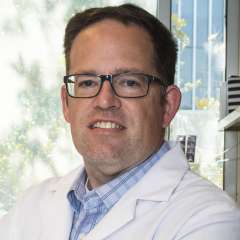
Associate Professor, Department of Molecular & Cellular Endocrinology
Director, Comprehensive Metabolic Phenotyping Core
Associate Director, Cancer Metabolism T32 Training Program
Arthur Riggs Diabetes & Metabolism Research Institute
Beckman Research Institute at City of Hope
Dr. Fueger received his BS and MS degrees in biological sciences and exercise physiology, respectively, from the University of Wisconsin – Milwaukee. He was awarded his PhD in molecular physiology & biophysics from Vanderbilt University School of Medicine for his integrative physiological studies on skeletal muscle glucose metabolism. He was a JDRF-funded postdoctoral fellow in the Department of Pharmacology and Cancer Biology at Duke University, where he became an expert in islet biology. Previously, he was an associate professor in the Department of Pediatrics in the Herman B. Wells Center for Pediatric Research at the Indiana University School of Medicine and co-director of the Bioengineering Interdisciplinary Training for Diabetes Research T32 Program with Purdue University. Dr. Fueger is the recipient of numerous awards including a Pathway to Independence Award (K99/R00) from NIH, Virendra B. Mahesh Award for Excellence in Endocrinology from the American Physiological Society, and Arti Hurria Research Mentoring Award from City of Hope. His current research interests are in pancreatic islet biology and hepatic metabolism, including the impact of fatty liver disease on the development of hepatocellular carcinoma, a form of liver cancer. Fueger Lab
Beth A. Glenn, PhD - Health Policy & Management
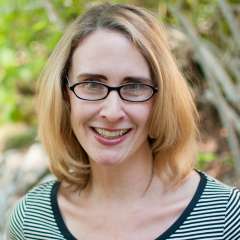
Professor and Vice Chair, Department of Health Policy and Management
Associate Director, UCLA Kaiser Permanente Center for Health Equity
UCLA Fielding School of Public Health
Co-Director, Community Outreach and Engagement
Member, Center for Cancer Prevention and Control Research
Co-Director, Cancer Control and Survivorship Research
UCLA Jonsson Comprehensive Cancer Center
Dr. Glenn is a professor and vice chair of the Department of Health Policy and Management in the UCLA Fielding School of Public Health, co-director for Community Outreach and Engagement and Cancer Control and Survivorship Research in the Jonsson Comprehensive Cancer Center at UCLA, and associate director of the UCLA Kaiser Permanente Center for Health Equity. The focus of her work is on conducting scientifically rigorous, yet pragmatic, research to design, implement and evaluate interventions aimed at reducing racial/ethnic and socioeconomic disparities in cancer and other chronic diseases. She serves as principal investigator or co-investigator on a number of ongoing projects including studies to compare the effectiveness of three approaches to increasing HPV vaccine completion in a Federally Qualified Health Center (FQHC), evaluate the effect of a multilevel CRC screening promotion intervention in a large FQHC, evaluate the effect of a multilevel obesity control intervention in preschools, and document and address disparities in liver cancer prevention and control among UC primary care patients. She has also conducted research focused on skin cancer prevention among children of Latino and non-Latino white melanoma survivors, lifestyle behaviors among ethnic minority breast and colorectal cancer survivors and breast, prostate and colorectal cancer screening among low income and ethnic minority populations. Dr. Glenn Profile | Dr. Glenn Jonsson Comprehensive Cancer Center Member
Yiqian Gu - Molecular, Cell & Developmental Biology
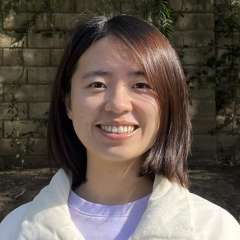
Staff Research Associate
Department of Molecular, Cell and Developmental Biology
UCLA College of Life Sciences
Yiqian is currently employed as a staff research associate at the University of California, Los Angeles, working in Dr. Matteo Pellegrini's lab. Yiqian received her bachelor’s degree in accounting from Central University of Finance and Economics and her master’s degree in finance from South China Normal University. Her main area of expertise is in transcriptomics, with a particular emphasis on spatial transcriptomics sequencing. She has actively participated in diverse research initiatives that investigate skin diseases and cardiovascular conditions through the application of spatial sequencing techniques. Yiqian possesses proficiency in utilizing well-established tools and is skilled in crafting customized pipelines specifically designed for spatial sequencing applications. Matteo Pellegrini Lab
Steven-Huy B. Han, MD, AGAF, FAASLD - Transplant Hepatology
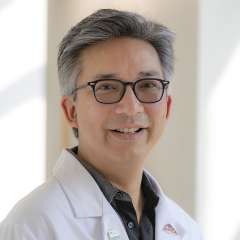
Philip L. Palumbo Chair in Clinical Hepatology
Program Director, Transplant Hepatology Fellowship
Director, Hepatology Clinical Research Center
Director, UCLA Asian Liver Center
Pfleger Liver Institute
Health Sciences Clinical Professor of Medicine & Surgery
Vatche & Tamar Manoukian Division of Digestive Diseases
Division of Liver and Pancreas Transplantation
David Geffen School of Medicine at UCLA
Dr. Han received his undergraduate degree in biochemistry from the University of California, Berkeley and then attended medical school at Albany Medical College in Albany, New York where he received his MD degree. Following a residency in internal medicine at Santa Clara Valley Medical Center and Stanford University, Dr. Han completed a clinical fellowship in hepatology at the University of Southern California under the guidance of Dr. Telfer B. Reynolds. He then trained at the University of California, Los Angeles where he completed a clinical fellowship in gastroenterology and transplant hepatology. Since then, Dr. Han has remained at UCLA, where he is now professor of medicine and surgery in the Division of Digestive Diseases and the Division of Liver and Pancreas Transplantation. In addition to his patient care responsibilities in hepatology and liver transplantation, Dr. Han plays an active role in the clinical training of medical students, medical residents, and subspecialty fellows and is the current program director of the Advanced Transplant Hepatology Fellowship at UCLA. Dr. Han's research interests have focused on the treatment of chronic viral hepatitis B and C, the prevention of recurrent viral hepatitis after liver transplantation, and the prevention and treatment of hepatocellular carcinoma. He is the principal investigator of the National Institute of Health (NIH) Hepatitis B Clinical Research Network in Los Angeles, co-principal investigator of the National Cancer Institute (NCI) Translational Liver Cancer Consortium, and multiple clinical studies involving treatment of chronic hepatitis B and C. Dr. Han also serves on the editorial boards of Gastroenterology, Hepatology, and Clinical Gastroenterology and Hepatology and is a guest associate editor for Gastroenterology and Digestive Diseases and Science. He has published many articles in the area of viral hepatitis, liver transplantation, and liver cancer and is an active speaker, lecturing on these subjects both nationally and internationally. He has been recognized by Best Doctors every year since 2003. He is a past president of the Southern California Society of Gastroenterology and an ongoing council member. Dr. Han Profile
Andrea L. Hevener, PhD - Endocrinology, Diabetes & Hypertension

Professor of Medicine
Sidney Roberts and Clara Szego Roberts Chair in Molecular Endocrinology
Division of Endocrinology, Diabetes and Hypertension
David Geffen School of Medicine at UCLA
Iris Cantor-UCLA Women’s Health Center
Dr. Hevener’s laboratory studies the transcriptional regulation of metabolism and insulin action with a specific focus on the biological actions of hormone responsive nuclear receptors in metabolic tissues. Dr. Hevener is the associate director for research of the Iris Cantor-UCLA Women’s Health Center and the director of the NIH-sponsored UCSD-UCLA Diabetes Research Center Metabolic and Molecular Physiology Core. Dr. Hevener’s laboratory is supported UCLA Department of Medicine, the STOP CANCER Foundation I.C.O.N. Award, the Helmsley Charitable Trust, the UCLA CTSI, and the Iris Cantor Women’s Health Executive Advisory Board. In addition to ongoing National Institutes of Health R01 funding, Dr. Hevener is currently the principal investigator of Project 3 of an NIH U54 Specialized Center of Research Excellence (SCORE) studying sex differences and women’s health related to metabolism and the lead investigator of an NIH Director’s Common Fund award to study the molecular transducers of physical activity as part of the MoTrPAC consortium. The overarching goal of the Hevener laboratory is to identify therapeutic opportunities to improve the metabolic health of women and reduce chronic disease risk and burden.
Wendong Huang, PhD - Diabetes Complications & Metabolism
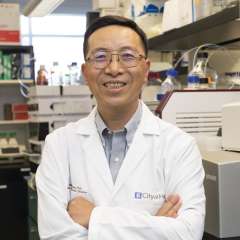
Professor, Department of Diabetes Complications & Metabolism
Arthur Riggs Diabetes and Metabolism Research Institute
Beckman Research Institute
City of Hope National Medical Center
Dr. Huang obtained his PhD degree from UT MD Anderson Cancer Center. He then did his postdoctoral training with Dr. David Moore at Baylor College of Medicine. Dr. Huang is currently a professor in the Department of Diabetes Complications & Metabolism at the Arthur Riggs-Diabetes and Metabolism Research Institute, Beckman Research Institute of City of Hope National Medical Center. He is also an adjunct faculty in the Keck Medical School, University of Southern California. He is an associate editor and editorial board member of several academic journals. He is the recipient of a number of academic awards, including the March of Dimes Basil O'Connor Starter Award, the Sidney Kimmel Cancer Foundation Fellowship Award and ACS Research Scholar. He has so far published more than 160 peer-reviewed papers. His research focuses on the molecular genetics of diabetes/metabolism and cancer. In addition, his lab has developed novel therapeutic small molecules for both cancer and metabolic diseases. Wendong Huang Lab
Shehnaz K. Hussain, PhD, ScM - Epidemiology; Public Health Sciences

Professor, Department of Public Health Sciences, University of California (UC) Davis
Associate Director for Population Sciences, UC Davis Comprehensive Cancer Center
Dr. Hussain is an epidemiologist with an established research record identifying novel and modifiable environmental and host factors for cancer etiology, early detection, and prevention. Her research aims to explore underlying biologic mechanisms along the cancer control continuum, focusing often on diverse and vulnerable populations. She is the principal investigator for The Microbiome, Microbial Markers, and Liver Disease (M3LD) Study (R01CA204145), a multicenter prospective cohort with diverse ethnoracial composition (>40% Latinx) of men and women with liver cirrhosis designed to address the unmet clinical need for accurate biomarkers and models to improve the early detection for HCC. Dr. Hussain is also co-PI for an NIH-funded randomized double-blinded, placebo-controlled phase II trial of a six-month simvastatin intervention to reduce disease progression in patients with liver cirrhosis awaiting a liver transplant, called the Statin Operates to Prevent (STOP) HCC Study (NCT02968810), and co-PI for a randomized controlled trial to evaluate the effect of two hypocaloric dietary interventions, ketogenic diet versus standard weight loss diet, on the change in intrahepatic triglyceride content measured by MRI-proton density fat fraction for patients with non-alcoholic fatty liver disease (NCT03784716). As associate director for Population Sciences at the UC Davis Comprehensive Cancer Center, she leads strategic research initiatives that address key concerns of our community including the health impacts of wildfires. She was recently awarded 2 million dollars from the University of California Office of the President to partner with key fire service stakeholders to develop a cohort of California firefighters to study wildfire emissions/exposures, behavioral factors, and cancer risk biomarkers. Physician Profile
Fady M. Kaldas, MD, FACS - Liver Transplant Surgery
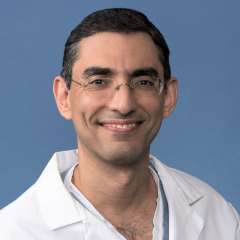
Professor of Surgery
Kelly Lee Tarantello Chair in Liver Transplantation
Director, Liver Transplant Service
Director, Transplant & Hepatobiliary Surgery Fellowship Program
Department of Surgery, Division of Liver and Pancreas Transplantation
David Geffen School of Medicine at UCLA
Dr. Kaldas specializes in the surgical management of benign and malignant liver disease including resection of liver tumors, and bile duct cancer, to complex primary and redo adult and pediatric liver transplantation. He co-established the UCLA heart-liver disease program aimed at caring for patients with failing Fontan physiology and other patients needing combined heart-liver transplantation. Dr. Kaldas is principal investigator on NIH and non-NIH funded research studies in ischemia reperfusion injury of the liver, liver transplant prognostic modeling, and heart-liver transplantation. Dr. Kaldas’ mentees in the lab range from visiting scholars to surgical fellows, who are consistently able to present their work at national meetings. He has authored and co-authored over 160 abstracts and 114 peer reviewed publications, many of which are in high impact journals including Gastroenterology, Hepatology, JAMA, and the Journal of the American College of Cardiology. He has also been an invited speaker at local, national, and international meetings and holds positions in national surgical organizations. He is certified by the American Board of Surgery and the American Society of Transplant Surgeons, and he is a Fellow of the American College of Surgeons. Dr. Kaldas Profile
Dorota Kaminska, PhD - Medicine
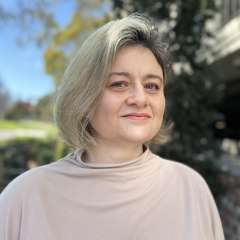
Assistant Project Scientist
David Geffen School of Medicine at UCLA
Dr. Kaminska completed her MSc and Eng degree in biotechnology, with a major in molecular biology, at Wroclaw University of Science and Technology in Wroclaw, Poland. She then earned her PhD in molecular medicine at the University of Eastern Finland in Kuopio, Finland.
Before joining UCLA, she held research positions at the University of Eastern Finland; Turku PET Centre in Turku, Finland; and the Polish Academy of Sciences in Krakow, Poland, where she studied the molecular mechanisms of pain and addiction, obesity, weight loss, and MASLD.
At UCLA, she was recruited as an assistant project scientist, where she applies multi-omics approaches to investigate the genetic regulation of mitochondrial function in the liver and interorgan crosstalk in MASLD. Her research integrates data from the Hybrid Mouse Diversity Panel (HMDP) and human studies to explore MASLD pathogenesis and fibrosis progression. She continues to advance the understanding of metabolic disease pathophysiology, leveraging computational and experimental approaches to uncover mechanisms underlying liver dysfunction, fibrosis, and sex differences in MASLD.
Jennifer Kolb, MD, MS - Digestive Diseases

Health Sciences Assistant Professor of Medicine
Vatche & Tamar Manoukian Division of Digestive Diseases
David Geffen School of Medicine at UCLA
Staff Physician — VA Greater Los Angeles Health Care
Dr. Kolb received her undergraduate degree from the University of Pennsylvania and her medical degree from the Icahn School of Medicine at Mount Sinai where she graduated with distinction in research and was a member of the Gold Humanism Honor Society. She also completed her internal medicine residency at Mount Sinai. She completed her gastroenterology and hepatology fellowship at the University of Colorado where she was on the NIH T32 research training grant and earned a master’s degree in clinical science. She completed an advanced endoscopy fellowship at UC Irvine prior to joining UCLA. Dr. Kolb is currently an assistant professor of medicine at the David Geffen School of Medicine at UCLA and a staff gastroenterologist at the West Los Angeles VA Medical Center.
Her clinical work encompasses a broad set of therapeutic endoscopy procedures, and she has a particular interest in interventions for foregut disease including esophageal motility disorders, Barrett’s esophagus, GERD, and obesity. At the VA, she directs the endobariatric program which works closely with the hepatology clinic in collaboration with the multidisciplinary weight loss program. Her research also focuses on early detection of Barrett’s esophagus and esophageal cancer through novel screening strategies and improved endoscopy quality. Physician profile
Jerzy W. Kupiec-Weglinski, MD, PhD - Liver Transplant Surgery, Pathology & Experimental Medicine
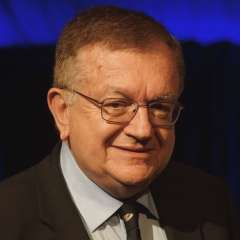
Distinguished Professor, Department of Surgery, Pathology and Experimental Medicine
The Inaugural Paul I. Terasaki Endowed Chair in Surgery
Director, Dumont-UCLA Transplantation Research Laboratories, Department of Surgery
David Geffen School of Medicine at UCLA, Los Angeles, CA
Dr. Kupiec-Weglinski received his medical degree from Warsaw Medical Academy, Poland, and a PhD in transplantation immunology from Polish Academy of Sciences. Then, he spent 18 years working in experimental organ transplantation at the Brigham and Women’s Hospital at Harvard University. Since being recruited to UCLA in 1997, he has been leading basic and translational research at the Dumont-UCLA Transplantation Center, one of the largest liver transplantation programs in the country. The Kupiec-Weglinski Lab has been at the forefront of cutting-edge research and several advancements in transplantation that have contributed to its current level of success. His contributions to the field fall into three principal categories: 1/ the discovery of key biological pathways responsible for organ innate immune-driven peritransplant stress and alloimmune mediated rejection response; 2/ the development of novel therapies that control these pathways; and 3/ solving one of the most vexing problems in transplantation, i.e., how to improve the quality and number of organs available for life-saving surgery. In search for refined personalized treatment, his Lab has also pioneered translational research on the role of microbiota and bacteriophage therapy in liver transplantation, as well as vascularized composite allografts. Dr. Kupiec-Weglinski published over 250 peer-reviewed original papers, 70 reviews, 40 chapters, and one book. His research for the past 35 years has been continuously funded by NIH. He was a Member, Board of Directors, American Society of Transplantation; a Standing Member, Transplantation-Tolerance-Tumor Immunology (TTT) NIH Study Section; and a frequent Ad-hoc reviewer for NIH and DoD. He is the recipient of American Society of Transplantation/Astellas Established Investigator Award; Awards from the International Transplantation Society for Outstanding Achievements in Basic Science; and Mentorship/ Education and Training; and holds Honorary Doctorate (“Honoris Causa”) from his alma mater in Warsaw, Poland. Dr. Kupiec-Weglinski is the founding editor in chief of Frontiers in Transplantation and serves as associate editor to Current Opinion in Organ Transplantation. Dr. Kupiec-Weglinski Profile
Alan C. Kwan, MD - Cardiology
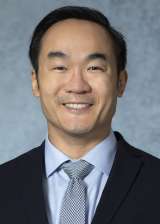
Assistant Professor, Department of Cardiology, Smidt Heart Institute
Associate Medical Director, Biomedical Imaging Research Institute
Cedars-Sinai Medical Center
Dr. Kwan earned his medical degree from the University of Washington, also completing a research fellowship at the National Institutes of Health in cardiovascular imaging. He trained in internal medicine at the Johns Hopkins Hospital, before undergoing cardiology fellowship at Cedars-Sinai Medical Center. During his fellowship, he received advanced research training through the NIH T32, as well as training in clinical advanced cardiac imaging, and a master’s in magnetic resonance in medicine, joining staff in 2021. He is board certified in cardiology, internal medicine, echocardiography, cardiac MRI, cardiac CT, and nuclear cardiology. His research interests include heart-liver interactions, specifically the underlying drivers of cardiovascular disease in patients with metabolic dysfunction-associated steatotic liver disease. Physician profile
Gerald S. Lipshutz, MD, MS - Surgery; Molecular & Medical Pharmacology
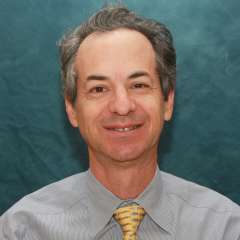
Goldwyn Chair
Professor, Department of Surgery
Professor, Molecular and Medical Pharmacology
Vice Chair, Research, Department of Surgery
David Geffen School of Medicine at UCLA
Dr. Lipshutz received his medical degree from the University of California Los Angeles School of Medicine and completed his postgraduate training at the University of California San Francisco School of Medicine. Dr. Lipshutz is a professor within the Department of Surgery and the Department of Molecular and Medical Pharmacology. He is also a member of the Intellectual and Developmental Disabilities Institute at UCLA along with the Broad Center; he presently holds the Goldwyn Chair clinically. Within the David Geffen School of Medicine, he was previously the Chair of the Academic Medicine College. His clinical specialty and interests include solid organ transplantation. His laboratory focuses on developing and gene and cell therapies for single gene metabolic disorders of the liver. These conditions typically cause brain injury with intellectual disability and he has developed several mouse models and preclinical therapies to treat these disorders primarily focusing primarily on specific urea cycle and creatine deficiency disorders. He serves as an editorial board member of Gene Therapy, Molecular Therapy, and Molecular Therapy-Methods and Clinical Development. Dr. Lipshutz has been an invited participant in multiple NIH conferences and has served as a grant reviewer for both the Wellcome Trust and the US National Institutes of Health where he served as a standing member of the GDD and DBTD study sections. Lipshutz Hepatic Regenerative Medicine Lab
Aldons J. "Jake" Lusis, PhD - Microbiology, Human Genetics & Medicine
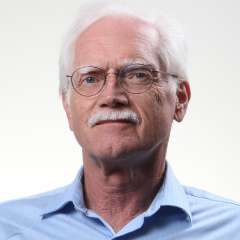
Professor, Microbiology, Human Genetics and Medicine
David Geffen School of Medicine at UCLA
Dr. Lusis’ lab studies naturally occurring genetic variations in mice and in humans to help understand interactions underlying complex cardiovascular and metabolic disorders. A major focus of the lab has been integrate clinical traits with “intermediate" phenotypes obtained using high throughput technologies such as RNA sequencing, metabolomics, or proteomics, an approach known as "systems genetics" (Seldin et al. 2019 Nature Metab. 1:1038-1050). To facilitate this approach, they have developed a reference resource termed the Hybrid Mouse Diversity Panel (HMDP) that can be used to carry out whole-genome association mapping and analyze complex genetic interactions (Norheim et al. 2019 Cell Metab. 29; 1-18). Current research projects include atherosclerosis, heart failure, fatty liver disease and obesity. Lusis Lab